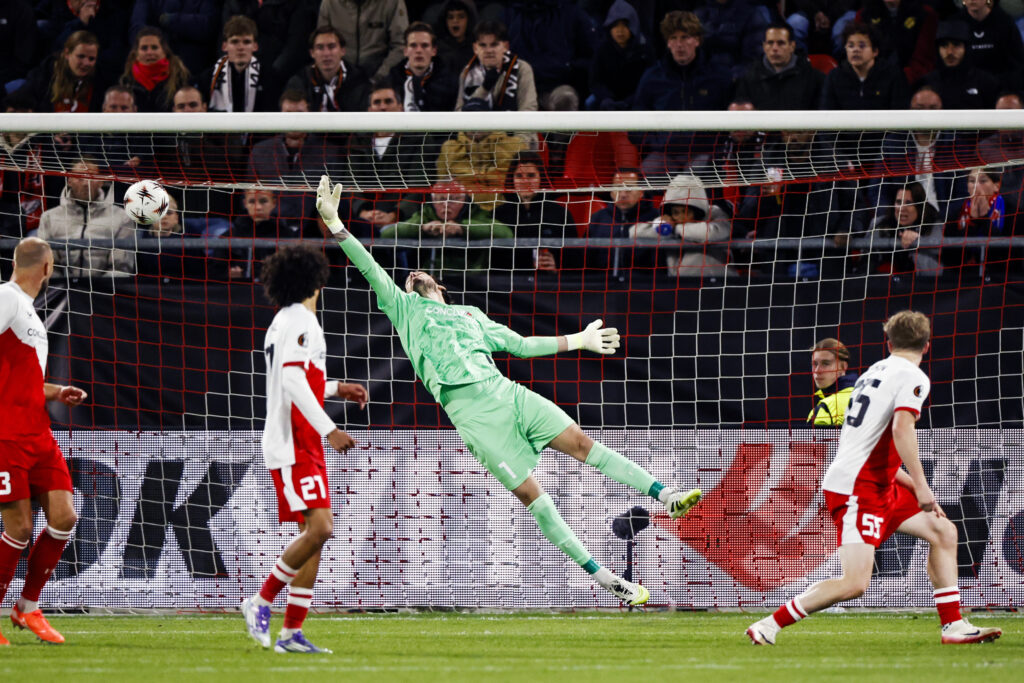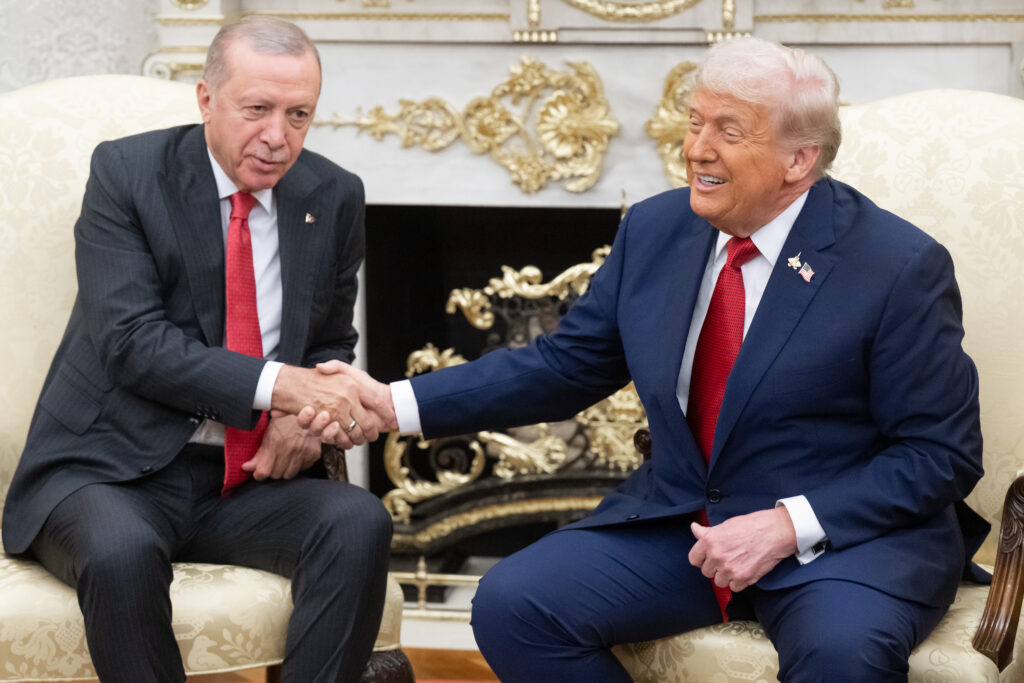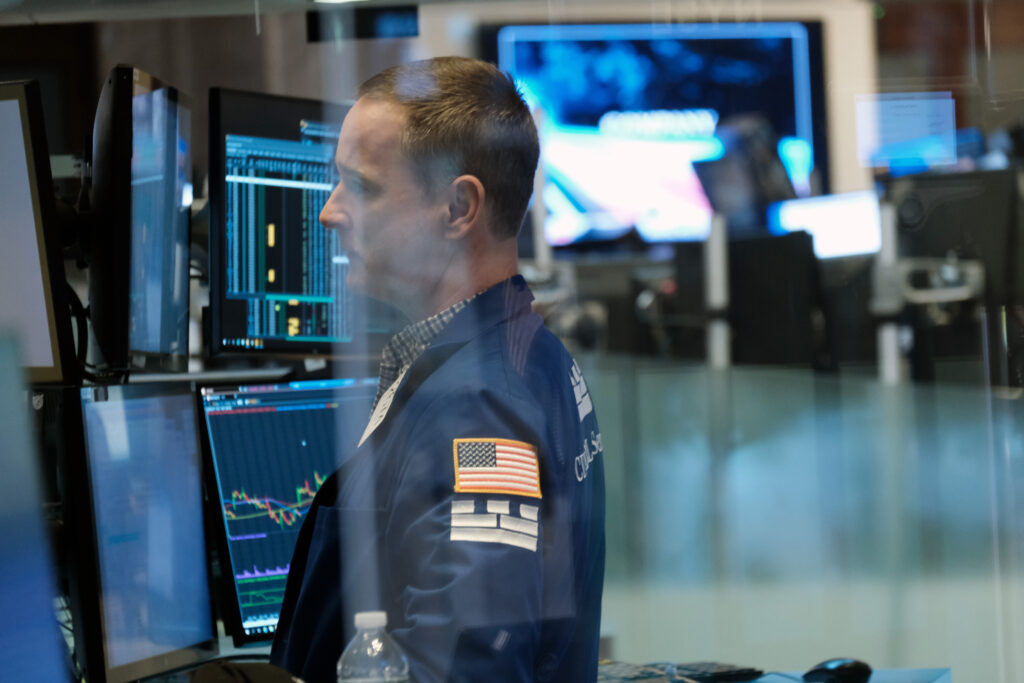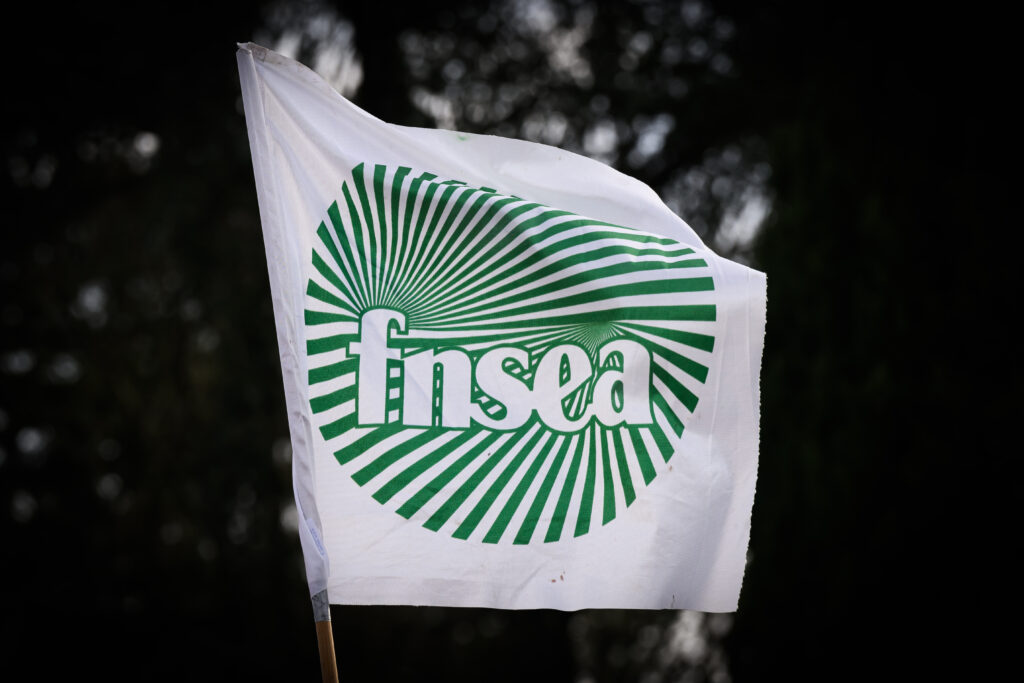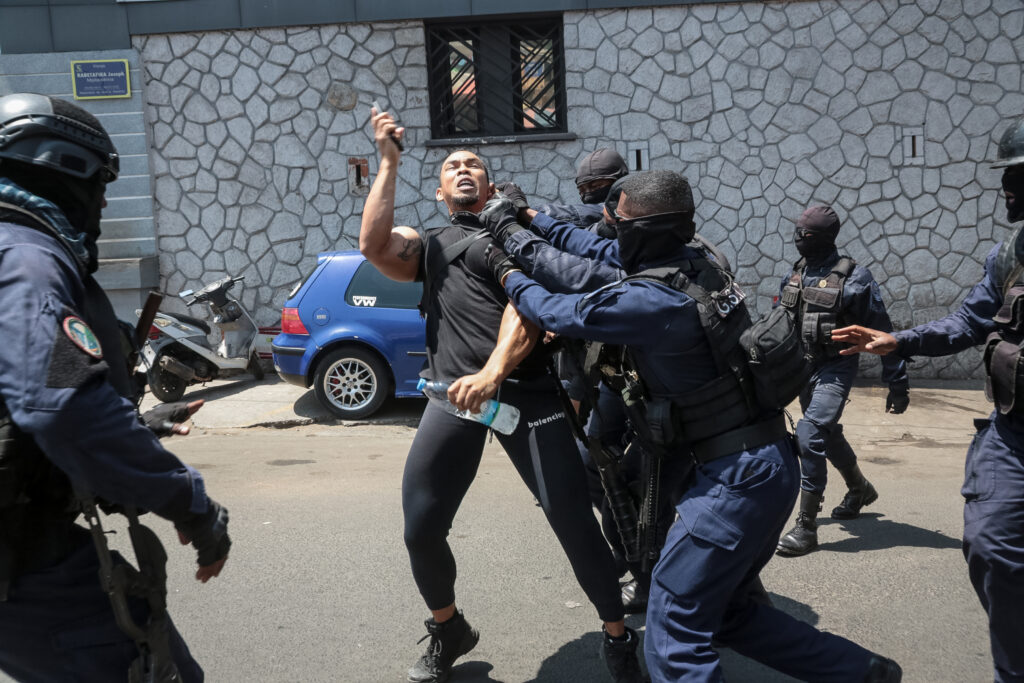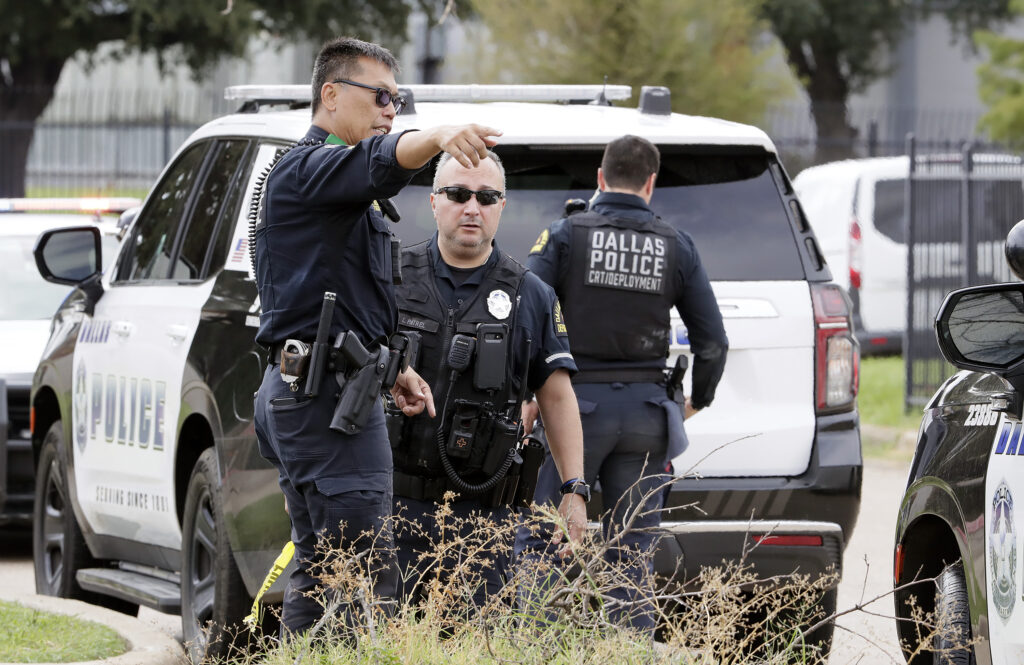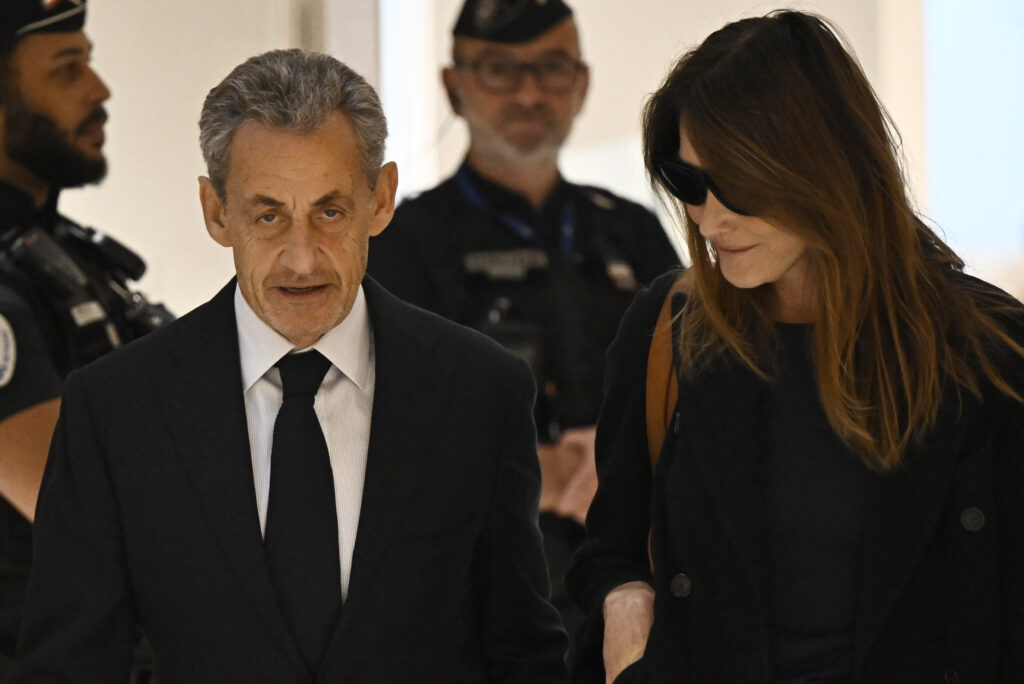Ligue Europa: Lyon prend un départ convaincant à Utrecht
L’Olympique lyonnais, quart de finaliste de la compétition la saison dernière, a pris un départ convaincant jeudi lors de la première journée de Ligue Europa en s’imposant à Utrecht grâce à un but de Tanner Tessmann.L’Américain a sorti le match d’une ennuyeuse torpeur grâce à une frappe aux seize mètres à quinze minutes du terme, à la réception d’une action initiée par Rachid Ghezzal.Un but qui a signé le coaching gagnant de Paulo Fonseca qui n’a pas hésité à opérer quatre changements à l’heure de jeu.Alors que l’avant-match entre supporteurs a été quelque peu tendu, des vidéos diffusées sur les réseaux sociaux montrant quelques jets de chaises et de fumigènes entre “ultras” des deux équipes (rapidement calmés par la police locale), la première période entre les deux équipes a été à l’inverse très tranquille.Les Néerlandais, avec le Franco-ivoirien Sébastien Haller titularisé en pointe, ont globalement posé le pied sur le ballon durant les 45 première minutes sans toutefois inquiéter le gardien lyonnais. Quarts de finalistes de cette Europa Ligue l’an passé (éliminés à ce stade par Manchester United), les Gones sont d’abord apparus bien timides dans le vieux stade du Galgenwaard au point de ne cadrer aucun tir en première période.Mais si Utrecht a mis de la vitesse en début de match, les hommes de Paulo Fonseca ont ensuite équilibré les échanges au point de dominer la deuxième période.De quoi confirmer les cinq premières journées solides des Lyonnais en Ligue 1 qui ont aligné quatre victoires et n’ont perdu qu’un match, il y a douze jours à Rennes (1-3), malgré une équipe largement remaniée par rapport au onze-type de la saison passée.Nicolas Tagliafico et ses équipiers auront l’occasion d’enfoncer le clou lors des prochains matches, sur le papier abordables, avec notamment la réception du RB Salzbourg le 2 octobre avant d’accueillir le FC Bâle.
Trump cozies up with Turkey’s Erdogan over ‘rigged elections’
US President Donald Trump said Thursday that his Turkish counterpart Recep Tayyip Erdogan “knows about rigged elections better than anybody,” as he drew common ground with the leader often accused of autocratic behavior.Trump, who falsely claims election fraud thwarted his 2020 presidential bid, said he and Erdogan stayed friends while he was out of office — a period the American called “exile.”And Erdogan, in power since 2014, earned Trump’s praise Thursday despite a crackdown in Turkey on the opposition and the media. “This is a guy who’s highly opinionated. Usually, I don’t like opinionated people, but I always like this one, but he’s a tough one,” Trump said as he hosted Erdogan in Washington.It was Erdogan’s first bilateral visit to the White House since 2019 during Trump’s first term, with former president Joe Biden having a tense relationship with the Turkish leader he labeled an “autocrat.”Under Erdogan, authorities have targeted Turkey’s main opposition party with repeated arrests including of Istanbul’s powerful mayor Ekrem Imamoglu, who has been detained since March on corruption allegations he denies. Trump has sought to sideline democratic checks and balances since he returned to office in January. He has also long shown admiration for autocratic leaders, often positively highlighting how long certain heads of state have managed to hold on to power. In August, Trump heaped praise on Azerbaijan’s President Ilham Aliyev — who has led the former Soviet republic for 22 years — when he visited Washington.”That’s a long time, and the only reason you can be in a country that long is when you’re very smart and very confident,” he said.Trump himself has repeatedly teased the prospect of seeking a third term — something barred by the US Constitution.
Strong US data boosts dollar as Wall Street stocks fall again
Wall Street stocks retreated while the dollar rallied Thursday following stronger than expected US economic data that could delay Federal Reserve interest rate cuts.The US government revised its second-quarter economic growth rate upwards on Thursday to 3.8 percent from 3.3 percent, as consumers spent more than expected.It marks the fastest quarterly growth rate in nearly two years.”Is the US economy much stronger than believed?” queried InvestingLive currency analyst Adam Button, who added in a subsequent note that the US dollar could be poised to rally if there is a “big re-think” on the outlook for the US economy.The greenback rose Thursday against the euro, British pound and Japanese yen.But US equity indices retreated for a third straight day after posting a record on Monday.The stock market “did not like the good economic data we got this morning, because (it) basically calls into question the market’s assumption that the Fed will be cutting rates multiple times before the end of the year,” said Briefing.com analyst Patrick O’Hare.Analysts are focused on Friday’s release of the Fed’s preferred gauge of inflation — the Personal Consumption Expenditure (PCE) index — and next week’s nonfarm payrolls report.The US central bank — citing a weak labor market — last week announced its first rate reduction of the year, and forecast there could be two more by the end of 2025.But expectations were dealt a blow on Tuesday as Powell warned that stocks are “fairly highly valued” and that there was “no risk-free path” on rates.The PCE data “may also shift investor expectations over the speed and depth of additional easing measures from the US central bank,” said David Morrison, senior market analyst at financial services firm Trade Nation.Among individual stocks, Intel shot up nearly nine percent following reports the company has approached Apple about investing in the struggling chipmaker. Apple rose 1.8 percent.Amazon fell 0.9 percent as it reached an agreement to pay $2.5 billion to settle allegations from a US regulator that it used deceptive practices to enroll consumers in Amazon Prime and made it difficult to cancel subscriptions.Starbucks dipped 0.5 percent as it announced it would cut about 900 jobs and shutter some underperforming stores as part of a cost-cutting drive.In Europe, shares in German software giant SAP fell two percent after the EU launched an antitrust probe into the company.European stock markets were down at the close, including Zurich, which fell as the Swiss National Bank held rates at zero percent and warned that US tariffs were weighing on the economy.- Key figures at around 2020 GMT -New York – Dow: DOWN 0.4 percent at 45,947.32 (close)New York – S&P 500: DOWN 0.5 percent at 6,604.72 (close) New York – Nasdaq Composite: DOWN 0.5 percent at 22,384.70 (close)London (close) – FTSE 100: DOWN 0.4 percent at 9,213.98 Paris (close) – CAC 40: DOWN 0.4 percent at 7,795.42Frankfurt (close) – DAX: DOWN 0.6 percent at 23,534.83Tokyo – Nikkei 225: UP 0.3 percent at 45,754.93 (close)Hong Kong – Hang Seng Index: DOWN 0.1 percent at 26,484.68 (close)Shanghai – Composite: FLAT at 3,853.30 (close)Euro/dollar: DOWN at $1.1658 from $1.1738 on WednesdayPound/dollar: DOWN at $1.3335 from $1.3447Dollar/yen: UP at 149.81 yen from 148.90 yenEuro/pound: UP at 87.42 pence from 87.29 penceBrent North Sea Crude: UP 0.2 percent at $69.42 per barrelWest Texas Intermediate: DOWN less than 0.1 percent at $64.98 per barrel
Agriculture: quelques actions pour dénoncer des importations “aberrantes”
Blocage d’un Buffalo Grill, tracteurs et bennes devant la Maison de l’Europe… Quelques rassemblements symboliques se sont tenus jeudi à l’appel de la première alliance syndicale agricole FNSEA-Jeunes Agriculteurs, contre les importations “aberrantes” qui minent selon elle l’agriculture française.D’autres actions sont annoncées pour vendredi, loin malgré tout des grandes journées de blocage des deux hivers derniers alors que vendanges et récoltes occupent encore le monde paysan.Dans le viseur des agriculteurs, le projet d’accord de libre-échange entre l’Union européenne et des pays latino-américains du Mercosur dont Bruxelles a lancé début septembre le processus de ratification. La France, hier très opposée, semble depuis se montrer moins défavorable.Plus globalement, il s’agit de se mobiliser contre “le Mercosur, les taxes imposées par Donald Trump et le flot des importations internationales qui ne respectent pas les normes qui sont les nôtres”, a indiqué Arnaud Rousseau, le président de la FNSEA, qui dans un premier temps avait prévu des mobilisations plus tard dans l’automne.”N’importons pas ce qu’on ne veut pas qu’on produise. C’est ça, l’hypocrisie de l’Europe. Sous couvert d’écologie, on importe ce qu’on ne produit pas ici, avec aucune norme environnementale et sociale”, déplorait ainsi jeudi Dominique Noury, éleveur de vaches charolaises et de volailles, lors d’une action à Dijon.L’accord avec le Mercosur doit permettre à l’UE d’exporter davantage de voitures, machines, vins… Mais l’accord facilitera aussi l’entrée de bœuf, volaille, sucre, miel, riz, exemptés de droits de douane.Bruxelles insiste sur la faiblesse des volumes attendus, mais les filières européennes concernées crient au risque de déstabilisation et de baisse des prix, et surtout à la concurrence déloyale du fait de normes de production moins-disantes sur le plan sanitaire et environnemental et de contrôles défaillants.- Ordre syndical dispersé -Jeudi, une cinquantaine d’agriculteurs, selon des représentants syndicaux, ont bloqué l’entrée d’un Buffalo Grill à Pusey, près de Vesoul (Haute-Saône), pour la défense de la viande française. Avec une charolaise devant la porte d’entrée, ils ont tagué sur la devanture “Je suis français, je mange français”.”Les dégradations sur notre restaurant de Vesoul ne visent pas le bon acteur. Elles sont inacceptables”, a déploré auprès de l’AFP le directeur général de l’enseigne Robert Guillet, assurant qu” à aucun moment nous n’avons ne serait ce que penser à importer depuis les pays d’Amérique du Sud”. Dans le centre de Dijon, 150 agriculteurs sont venus, avec 41 tracteurs et bennes, déverser fumier, terre et paille devant la Maison de l’Europe. “On importe de la viande qu’on n’a pas le droit de produire chez nous, alors qu’on a l’agriculture la plus durable au monde”, a expliqué à l’AFP Antoine Fauchet, président des JA d’Is-sur-Tille (Côte d’Or).La mobilisation se poursuivra vendredi sous diverses formes: mobilisations en supermarchés, défilés devant des préfectures, présentation de produits jugés “aberrants” (pommes du Chili, noix des Etats-Unis, etc), ou manifestation régionale avec tracteurs place d’Armes, devant le château de Versailles.Pour les agriculteurs interrogés par l’AFP en Occitanie, cette date du 26 septembre ne convient pas, en période de vendange et de récolte céréalière, “maïs, tournesol, soja, sorgho”, énumère Jérôme Barthès, président de la FDSEA de l’Aude: “c’est trop tôt dans la saison. Il peut y avoir un manque d’agriculteurs impliqués” dans la mobilisation.Son syndicat prévoit une action vendredi aux abords de Carcassonne. Ce sera “surtout de la communication, des distributions de tracts”, dit-il.En Haute-Garonne, la FDSEA souligne que la “base, elle suit. Même s’il n’y a pas de gouvernement, on veut que la copie soit déjà sur le bureau du, ou de la, prochaine ministre”, explique Luc Mesbah, secrétaire général.Le texte sur le Mercosur doit encore être approuvé par les États membres puis par le Parlement européen, la Commission espérant leur aval d’ici fin décembre.Les syndicats agricoles expriment leur opposition au traité dans un rare mouvement d’unanimité. Mais ils se mobilisent en ordre dispersé.La Coordination rurale (CR), dans une volonté de se démarquer, veut être reçue par le Premier ministre Sébastien Lecornu pour lui présenter ses propositions, avant une mobilisation “avant la fin de l’année”.Le 3e syndicat, la Confédération paysanne, pour sa part a annoncé une manifestation à Paris, “tracteurs en tête”, le 14 octobre.
Madagascar police fire tear gas at protest over power, water cutsThu, 25 Sep 2025 19:44:05 GMT
Madagascar police fired tear gas and rubber bullets Thursday as protests in the capital Antananarivo over repeated water and electricity outages spiralled into chaos with looting and arson.The Indian Ocean island is one of the poorest countries on the globe despite vast natural resources.Police patrolled the capital in large numbers from early morning after authorities banned …
Dallas gunman wanted to ‘terrorize’ ICE agents: official
The gunman who opened fire on an immigration facility in Dallas apparently acted alone and was seeking to “terrorize” federal agents, US officials said Thursday.Joshua Jahn, 29, died from a self-inflicted gunshot wound after spraying the US Immigration and Customs Enforcement (ICE) center with gunfire on Wednesday.One ICE detainee was killed and two others were wounded but officials said Jahn’s intended target was ICE, the agency chiefly responsible for carrying out President Donald Trump’s pledge to expel millions of undocumented migrants.Nancy Larson, acting US attorney for the North District of Texas, told a press conference that a collection of notes found at Jahn’s residence laid out his motivations.”It’s clear from these notes that he was targeting ICE agents and ICE personnel,” Larson said. “He hoped his actions would terrorize ICE employees and interfere with their work, which he called human trafficking.”The tragic irony for his evil plot here is that it was a detainee who was killed and two other detainees that were injured,” she added.FBI special agent Joe Rothrock said Jahn apparently put months of planning into the attack and legally purchased the rifle that he used in August.Jahn opened fire on the ICE facility from the roof of a nearby building and the FBI director published a photo on X of five of his unspent bullets — one of which was marked with the words “ANTI-ICE.””His words were definitively anti-ICE,” Larson said. “That said, we did not find evidence of membership in any specific group or entity.”ICE’s prominent role in the Trump immigration crackdown has sparked widespread criticism over its use of armed, masked agents to conduct raids in public places against undocumented migrants.Trump blamed the Dallas attack on rhetoric directed at ICE by “Radical Left Democrats.”After ICE immigration raids in Los Angeles spurred unrest and protests earlier this year, Trump dispatched the National Guard and US Marines to the California city.
France’s Sarkozy prepares for five-year prison term after guilty verdictThu, 25 Sep 2025 19:37:50 GMT
A court on Thursday sentenced former French president Nicolas Sarkozy to five years in prison over a scheme for late Libyan dictator Moamer Kadhafi to fund his 2007 presidential run.In a verdict that will make the rightwinger the first French postwar leader to serve jail time, the Paris criminal court convicted Sarkozy, 70, on criminal …

